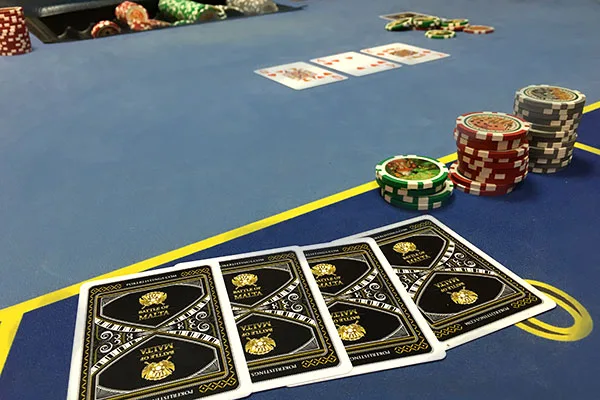
Beginner’s Guide to Omaha Poker: Mastering the Game
Omaha poker is a community card game similar to Texas Hold’em but with a key difference: players are dealt four private cards and must use exactly two of them, along with three of the five community cards, to make their best five-card hand. This game is typically played in high-only but can also be found in high-low split format, making it versatile for different types of players and situations.
The game works best in a structured environment where strategic thinking and a good understanding of hand rankings are essential. It thrives in both cash game settings and tournament formats, providing ample opportunities for exciting gameplay and strategic depth.
What Are the Rules of the Game and What Advice Can Be Given to a Beginner
To start, each player is dealt four private cards (‘hole’ cards). Five community cards are then dealt face-up on the ‘board’. Players must make the best possible five-card poker hand using exactly two of their hole cards and three community cards. The game typically consists of a small blind, a big blind, and four rounds of betting: pre-flop, on the flop, on the turn, and on the river.
For beginners, it is crucial to be selective with starting hands. Strong starting hands in Omaha usually involve cards that work well together, such as those that are double-suited or connected, increasing the chances of making a flush or a straight. It’s also important to be patient and wait for optimal situations to maximise your potential returns.
Additionally, understanding the basic odds and probabilities of Omaha is beneficial. This knowledge can help you make more informed decisions about when to bet, fold, or call, based on the strength of your hand and the community cards shown.
What Are the Varieties of This Poker
Omaha poker comes in several varieties, each with its unique twist. The most common is Omaha High, where the highest hand wins the pot. Omaha Hi/Lo, or Omaha Eight or Better (O8), is another popular variant where the pot is split between the highest and lowest qualifying hands. In this version, the low hand must qualify with five cards eight or lower.
Another variant is Pot Limit Omaha (PLO), where players can bet up to the size of the total pot. This variant is particularly popular in Europe and online platforms. There’s also No Limit Omaha, which, while less common, allows players to bet any amount of their chips at any time, adding a level of unpredictability and strategy.
For those looking for even more complexity, there’s Omaha 5, which deals five hole cards instead of four, providing more potential hand combinations and strategic possibilities. Each of these variants requires slightly different strategies and adjustments, so it’s important to understand the specific rules and betting structures before playing.
What Are the Strategies to Increase Your Chances of Winning
Winning in Omaha poker involves not only understanding the basic rules but also employing advanced strategies. Position is a key factor; playing from a late position can provide more information about other players’ actions before making your own decisions.
Another important strategy is to play a tight-aggressive style, which involves selecting strong starting hands and betting aggressively to protect your hand and build the pot when you have a strong hand. This approach helps to minimise losses and maximise winnings.
Bluffing can also be effective in Omaha, especially in situations where the community cards do not appear to help other players’ hands. However, it’s important to bluff judiciously, as Omaha typically involves more possibilities and less predictability than Texas Hold’em.
Lastly, always be mindful of the draws. Omaha is a game of ‘nut’ hands, so it’s critical to aim for the highest possible hand because multiple players often draw to the nuts simultaneously.

How Popular Is This Version of Poker
Omaha poker has seen a surge in popularity over the years, particularly with the rise of online gaming. Its rich blend of strategic depth and dynamic gameplay makes it a second favourite only to Texas Hold’em among poker variants. The game’s complexity and the requirement for strong strategic play appeal to players looking for a challenge beyond the more common Hold’em.
In both live and online poker rooms, Omaha games are increasingly featured as part of tournament series and cash game offerings, indicating its growing popularity. The game’s appeal is also bolstered by the high volume of hands played and the large pots often seen in Pot Limit Omaha games.
The increasing number of strategy books, online tutorials, and dedicated Omaha platforms also signals the game’s enduring popularity and its solid place in the future of poker.
Are There Tournaments for This Type of Poker
Yes, Omaha poker tournaments are a staple in many major poker events. They are frequently featured in world-renowned tournaments such as the World Series of Poker (WSOP), often including several Omaha events in different formats like PLO and Omaha Hi/Lo. These tournaments attract players from all over the world and are known for their intense competition and substantial prize pools.
In addition to large international competitions, many local casinos and online sites offer regular Omaha tournaments with a variety of buy-ins and formats, providing opportunities for players of all levels to compete. These events are ideal for players looking to test their skills in a more structured and competitive environment.
The presence of Omaha poker in these prestigious tournaments helps to maintain its status as a popular and respected game within the poker community. Players often regard Omaha tournaments as a true test of their poker abilities, given the game’s complexity and the strategic depth required to succeed.
